“How many hours should an old dog sleep?” If you are looking over at your snoozing senior dog and asking yourself this question, integrative veterinarian Julie Buzby is here to help. By the end of this article, you’ll have guidelines for how long dogs may sleep, signs that your dog’s sleep patterns may indicate a problem, and tips to help your dog sleep more comfortably.
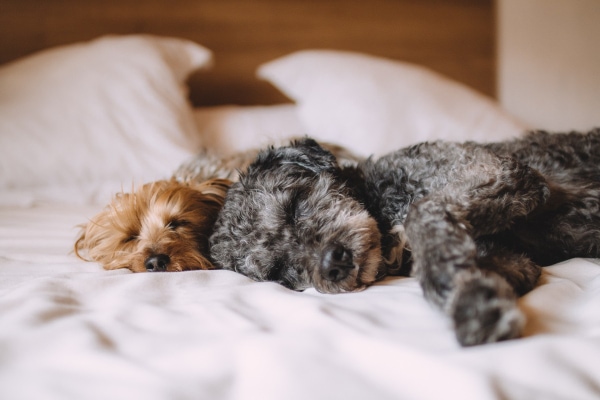
One common question I get asked by senior dog parents is, “How many hours should an old dog sleep?” It is normal for pet parents to become concerned when they notice their beloved older dog is sleeping more and more. Or, on the flip side, when they notice their dog seems to pace around all night long.
Since I frequently discuss this with my clients, I wanted to share this information with you too. Understanding what’s normal and what’s not can make it easier for you to know if the changes you are seeing could be pointing to a problem. Let’s start by establishing a baseline.
How many hours do dogs sleep at each age?
Just like humans, dogs have varying sleeping habits based on their age. It may not surprise you that similar to babies and elderly folks, puppies and older dogs need the most sleep.
How much do puppies sleep?
Puppies are busy developing, growing, and learning. All this hard work means that puppies sleep most of the day. Young dogs under one year old should sleep an average of 18 hours a day.
But just like human toddlers, puppies might need reminded that they need to stop moving and fall asleep. Crate training your puppy can be a great way to help with this. The crate can serve as a comfortable, quiet, and familiar spot to allow your puppy to relax and sleep.
How much do adult dogs sleep?
Adult dogs (ranging from one year old to about five or six) will sleep 8 to 14 hours a day. The amount of time that an adult dog sleeps will vary depending on age, breed, and activity level. For example:
- Younger adult dogs will probably sleep less than those closer to senior age.
- Medium breed dogs usually need less sleep than others.
- Large breed dogs sleep more during the day.
Dogs who are very energetic and working dogs will sleep less during the day. They are too busy and have too much adrenaline to take a nap. But come nighttime, these dogs will be worn out, so they typically sleep soundly through the night.
On the other hand, dogs who are couch potatoes or spend their time lying around are going to doze throughout the day. Since they have spent more time sleeping in the daylight hours, some of these dogs might be restless at night. However, if your dog is a sleep-aholic like my dog, he or she might happily nap all day and still sleep at night.
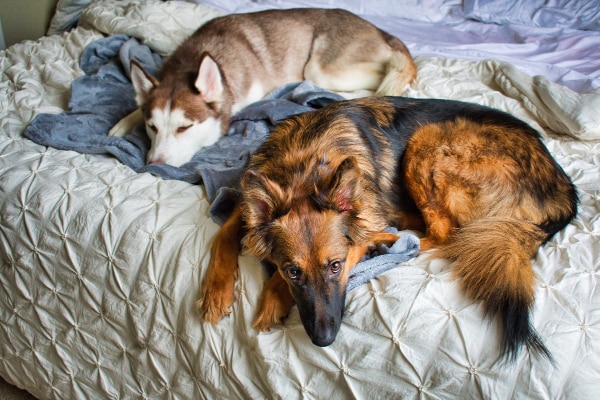
Finally, dogs who are left alone for longer periods of time will likely spend more hours asleep. With their family gone, they can take advantage of the quiet house and “catch some Z’s.” The exception to this would be dogs who suffer from separation anxiety. Since they tend to be restless or anxious when left alone, they will probably not sleep the day away.
How many hours should an old dog sleep?
Most dogs’ sleep patterns usually begin to change between five and seven years old. As dogs get older, their energy level starts to decrease. They need more sleep to recharge and be at their best during the day. For this reason, it is normal for a senior dog to sleep up to 20 hours a day. This can definitely make it feel like your old dog sleeps all day.
Why do old dogs sleep so much?
Granted, every dog (and human) needs sleep in order to function. But for senior dogs, there are five main reasons that explain why they sleep a lot:
- As dogs age, they tire easily and need more time to rest and catch up. Taking multiple naps throughout the day allows the body to relax and prepare for more activity.
- Sleep is very important for immune health. Sleeping for longer periods of time can help your senior dog’s body prevent infections.
- When dogs get older, they often become more restless. The interrupted sleep at night and senior dog anxiety at night can cause them to be more tired during the day.
- Senior dogs are more likely to be suffering from joint pain or other diseases that makes sleep uncomfortable. This can lead to the need for more naps since their sleep quality is poor. Sleeping can also be a way for them to try to “escape” their pain and discomfort.
- Older dogs have an increased risk of developing several diseases that can cause them to be a lethargic dog. Sudden changes in sleep patterns could be a sign that your dog is suffering from an underlying condition.
What are the warning signs of a problem?
I want to take a bit of time to focus in on number five on the list. It is true that for your senior dog, sleeping more during the day can be a normal part of aging. But, it could also be an indication that there is something wrong. And herein lies the root of my clients’ concerns about sleep habits.
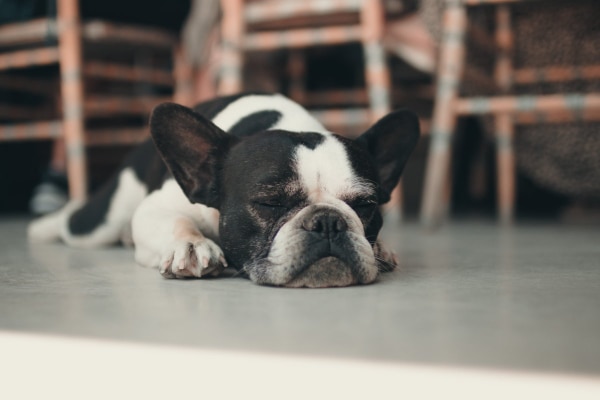
When faced with a dog who may be sleeping excessively or not sleeping enough, I often ask the dog parents a few questions:
1. Was the change in your dog’s sleep pattern sudden or gradual?
I usually suggest watching for sudden, unexpected changes in a dog’s sleep schedule as it tends to be a bigger red flag. For example, if your 8-year-old dog loves to go on walks every day and suddenly doesn’t have the energy to leave the house, there is likely something causing this change. But, if your dog has been sleeping more and more over the years and has gradually worked up to sleeping all day, this is more likely to be normal.
2. How does your dog act while sleeping?
Like us, dogs may dream while sleeping. You may see your dog twitching, shaking, or even running in his or her sleep. It is also normal for dogs to occasionally whimper, cry, bark, howl, or growl in their sleep. As long as your dog seems relaxed, these occasional noises or movements can be normal.
However, if you believe that your dog is in pain while sleeping, please discuss it with your veterinarian. Taking a video of your dog sleeping can be helpful for your vet to see what your dog is doing. It is also a good way to ensure that your dog is not having an old dog seizure rather than dreaming.
3. How does your dog act when awake?
Additionally, it is important to take other habits and symptoms into consideration. Does your dog have good energy when awake, normal appetite, good bathroom habits, and his or her typical personality? If yes, then your dog is probably just getting older and slowing down. If no, then this could be a sign of a problem.
4. Are you noticing other concerning symptoms?
If your dog is sleeping all the time (or barely sleeping at all) and has some abnormal clinical signs, it could be an indication of a health issue. Other symptoms to watch for include:
- Decreased or increased appetite
- Decreased water consumption or increased thirst in dogs
- Vomiting or diarrhea
- Sudden weight gain or loss
- Lethargy or dullness
- Abnormal urination and defecation (including accidents in the house or pooping or peeing while sleeping)
- Changes in hair coat (dull, dry, brittle, patchiness, etc.)
- Bloating or abdominal distention (i.e. a pot-bellied dog)
- Difficulty breathing or a dog who is breathing fast or heavy (either while awake or asleep)
- Old dog coughing or gagging
- Wandering or restlessness (especially in the middle of the night)
- Signs your dog is in pain
If you have any concerns about your dog’s sleeping habits or you’re seeing some of these signs, please make an appointment with your veterinarian.
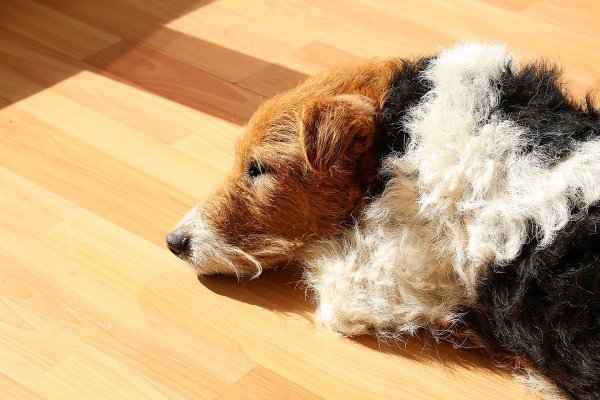
How will the vet figure out what is going on?
Once you arrive at the vet’s office, the veterinary team will ask you questions to understand what changes you are noticing at home. Then your vet will perform the physical examination and closely look at your dog. Depending on the symptoms and the results of the exam, your vet might recommend diagnostic tests such as:
- Bloodwork and a urinalysis to look for signs of diabetes, Cushing’s disease in dogs, hypothyroidism in dogs, kidney failure in dogs, liver disease in dogs, anemia in dogs, and other disease conditions.
- X-rays or ultrasound to evaluate the heart for signs of heart disease in dogs, the spleen for splenic masses in dogs such as hemangiosarcoma in dogs, and other organs such as the liver, kidneys, and GI tract for signs of enlargement, abnormalities, or tumors.
- An orthopedic exam to look for osteoarthritis in dogs, hip dysplasia in dogs, IVDD in dogs, torn ACL in dogs, or other reasons that a dog may be lying down more or struggling to walk or stand.
- A canine cognitive dysfunction checklist to evaluate for signs of dementia in dogs (i.e. sundowners in dogs), which can cause a dog to be awake and restless at night and sleeping all day.
If the diagnostics confirm that there is a specific disease causing your dog to sleep more, your veterinarian will discuss appropriate treatment and prognosis with you. Or if the results are normal and your dog is deemed healthy, your veterinarian might discuss how to monitor your dog for any changes.
Additionally, especially if the problem was that your dog isn’t sleeping well at night, the vet may also talk to you about how improve the quality of your dog’s sleep.
How can I help my old dog sleep through the night?
Getting proper sleep is necessary to maintain good physical, mental, and emotional health, and to prevent infections and other diseases. Therefore, it is important that your dog is comfortable and able to sleep deeply. I share these tips with my clients and wanted to pass them on to you too:
1. Create a comfortable sleeping environment
If your dog is struggling to get comfortable, consider adjusting where he or she sleeps. Senior dogs who sleep on their parents’ beds might need stairs or a ramp to get on and off the bed safely. Or they may start to prefer having their own comfy bed on the floor. That way they don’t have to climb or jump to find a good place to sleep.
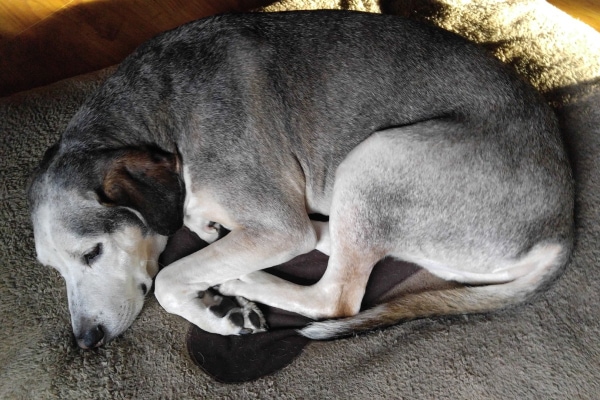
Also, dogs who have arthritis or other painful diseases can benefit from an orthopedic dog bed that is cushioned, supportive, and protects their joints. There are many different materials (e.g. egg crate foam, memory foam, etc.), shapes, thicknesses, and covers to consider when it comes to choosing a dog bed. And just like humans, every dog is different. It can take some trial and error to figure out what bed is best for your pup.
2. Add some ambiance
I have heard clients say that their dog needs a night-light or quiet music to help them sleep. Or other dogs actually prefer to sleep in their kennels instead of on a bed because they feel safe and protected there. It is all about what works for your dog.
3. Control your dog’s pain
Pain can make it difficult for a dog to sleep, no matter how nice the bed and environment are. If your dog seems to be stiff, uncomfortable, or you are seeing other signs of pain, please talk to your veterinarian.
There are a wide variety of options for natural pain relief for dogs like Dr. Buzby’s Encore Mobility™ hip and joint supplement. Plus, your vet can also prescribe pain medications like non-steroidal anti-inflammatories, gabapentin for dogs, tramadol for dogs, or amantadine for dogs.
4. Increase mental stimulation, activity, and mobility during the day.
If your dog wants to sleep all day and stay up all night, sometimes you can help “wear him or her out” for better nighttime sleep. Try taking your dog on a walk or dog wagon or dog stroller ride so that your dog is more tired come evening. Or consider incorporating mental stimulation toys and games for dogs into your daily routine.
Additionally, applying Dr. Buzby’s ToeGrips® dog nail grips can help your senior dog confidently walk around the house without fear of slipping on the floor. This may make him or her more likely to get up and engage with life during the day instead of sleeping all the time.
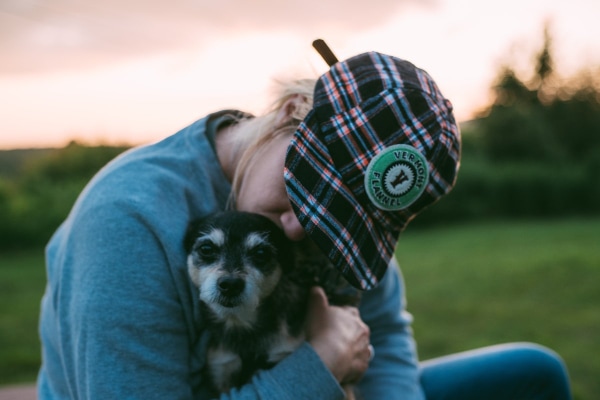
5. Talk to your vet about medications or supplements to promote nighttime sleep.
Especially if your dog has canine cognitive dysfunction and sleep-wake cycle disturbances, he or she may benefit from some sleep-aids. One great option is melatonin for dogs. This natural supplement can promote sleep and help establish a good sleep-wake cycle. However, it is important you check the label of the melatonin supplement to ensure it does not contain xylitol (i.e. birch sugar), which is toxic for dogs. Unfortunately, this dangerous sugar substitute is found in some melatonin products, especially gummies.
Another of my favorite supplements for helping restore normal sleep-wake cycles is Dr. Buzby’s Brain Boost™ organic MCT oil for dogs. Plus, as an added bonus, the MCT oil for dogs found in Brain Boost also helps decrease anxiety, improve memory and learning, and support overall brain health.
Additionally, some dogs who become anxious at night may benefit from trazodone for dogs, an anti-anxiety medication with mild sedative activity. If you think that your dog might be a good candidate for these (or other) medications and supplements, please talk to your veterinarian.
Work with your veterinarian
As a dog parent, it can be difficult to watch your dog approach his or her golden years. There are a lot of changes that accompany aging, including the changes in sleep pattern that we have discussed here.
In short, I want you to keep in mind that increased sleep is a normal part of being a senior dog. But if the change occurs suddenly, your dog is having trouble sleeping at night, or you are seeing any worrisome symptoms, it is best to check in with your vet. That way, if there is a problem, you and the vet can promptly create a plan to address it. And if everything is normal, you can rest a bit easier as you look over at your sleeping dog.
How much does your senior dog sleep?
Please comment below
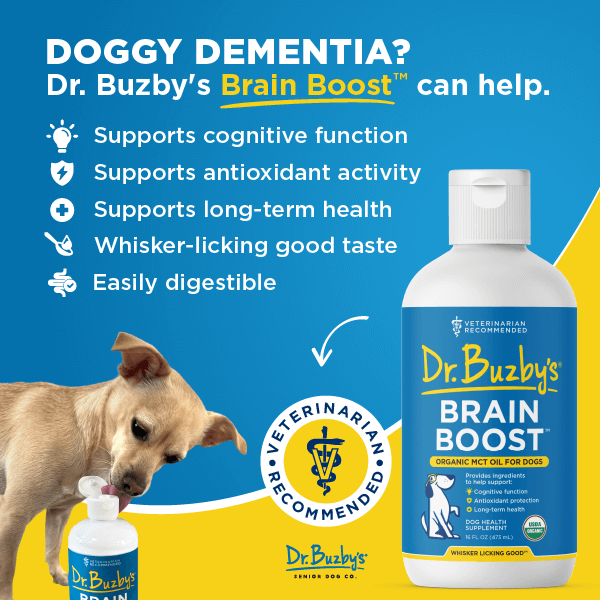


My 15yo Dachshund, Poppy, has Cushings and PRA. She is mostly all blind, her Cushings is under control, but she’s still extremely bossy and insists on sticking with her routine. When she came to us at 5yo from a breeder, she had no social skills and has always been very anxious. Accidents in the house have always been regular and we are on top of when to get her out. Because she is blind, she is carried in/out to avoid injury. Recently, she’s been barking a lot more when left alone and even more recently, it’s been difficult to get her out of bed in the morning. Her last out is usually between 8.30 & 9.00 pm, and she’ll sleep until noon if we let her. I often just pick her up from a sound sleep and take her outside and then she’s alert. When she’s home during the day with my husband, she paces & barks until she finally settles once she knows he’s still there. When I bring her to work, she has a routine and sleeps most of the day until I leave, and then I struggle to wake her up to go in her crate for the trip home. I think the sleeping all the time is because of old age, but there’s always chance it’s something else. I welcome thoughts. Thank you for reading.
Hi MonicaS,
I am sorry Poppy is experiencing these worrisome behaviors and is sleeping for so many hours a day. While these could all be symptoms of dementia (canine cognitive dysfunction) it is always a good idea to have other medical causes ruled out. Here is a link to an article with more information: Signs of Dementia in Dogs: Stages, Symptoms & Treatment
I am glad you seem to have a routine in place that is helping a bit. Praying your girl can maintain her quality of life for as long as possible. Best wishes to you both.
My lovely mixed breed sort of Collie-cross is now 15 years old. He was in good nick up to last year when he acquired Sudden Acute Retinal Degeneration. He is now completely blind and deaf. However, his appetite is good and we have both adjusted to the changed situation – I still take him out twice a day but our walks are much slower. More of a plod, really! He doesn’t seem to have had as much enthusiasm for his morning walks over the past couple of months and has to be coaxed to get up and I wondered if this was something he was trying to tell me. The afternoon walks are not an issue, so far. He is old and quite a big chap so perhaps he just finds it all too tiring. I don’t want to force him but subscribe to the school of thinking ‘if you don’t use it, you lose it’. Would you have any thoughts on this? I should appreciate a little guidance for my dear Monty.
Dear Joanna,
I am sorry your senior guy has lost his eyesight and is showing these worrisome changes to his behavior and personality. Without examining him myself it is hard to make specific conclusions. If you have not informed your vet about this new lethargy and lack of interest in morning walks, I would encourage you to do so. While this could be old age changes, I would want to rule out the possibility of other medical causes contributing to the situation. Hoping for clear answers for your sweet boy and wishing him many happy days ahead. Bless you both and keep up the good work.
I have an eight year old Pomeranian and he’s very active and loves to run around. Lately . He’s been acting very strange. He’s been peeing and pooping on the floor which is very abnormal for him and he’s been sleeping a lot more. What should I do?
Hi Tahani,
I understand your concern for your Pomeranian. Anytime there is a sudden change in behavior it is cause for concern. I highly recommend you contact your vet and have your boy evaluated. Hoping for quick answers and a clear path forward. Best wishes to you both!
Hello! I have a 13 year old male Labrador Retriever and he does sleep a lot. He has arthritis in his back hips. He’s eating great and drinking but wish a little more. I was looking to see if you have a supplement for his arthritis.
Hi Paula,
I understand your concern for your senior guy and think it is great you are advocating for his health and wellbeing. There are many supplements, medications, and treatments that can work wonders for dogs struggling with arthritis pain. Have you thought about trying Encore Mobility? I encourage you to look into it! I will attach some links to other articles with more information and great advice from other readers as well. I am certain you will find things to try that can help give your sweet boy some relief. Best wishes and keep up the good work!
1. Natural Pain Relief for Dogs: 13 Methods
2. How to Relieve Arthritis Pain in Dogs: The Ultimate Guide
3. Adequan for Dogs: Don’t Just Treat Arthritis, Slow it Down
4. Deer Antler Velvet: The Science Behind the Supplement
Hi:
my little man 16 1/2 year old Pomeranian sleeps about 20 to 22 hours a day. He is also about 70% blind. He eats we but does not drink water at all. we syringe him. He also gets daily subcutaneous fluids at home for kidney insufficiency. He used to be the life of the party up to age 14. Then he started slowing down. He loves cuddles and caresses. He will suck it up for hours on end with eyes opened and blinking yet snoring lol. He does not seem to be in pain. I can tell when he might have pain, and he gets Metacam.
Hi Anne,
I am glad your senior guy seems to be doing well despite his health issues. Thank you for sharing your story!
My cockapoo is 10 now and is 20kg, he doesn’t have the energy he used to have and sleeps a lot but still loves long walks and will run around in the park but tires more easily. I do wonder if I should be giving him some sort of supplements now?
Hi Linz,
It is very possible that a good supplement could give your pup some positive benefits. I recommend you talk to your vet and see what they recommend. They can guide you in the selection process and make sure the supplement you choose will address the most important concerns your dog is facing.
My beagle/dachshund mix just turned 18 and I’m noticing that she appears to be sleeping close to 20 hours a day. The hours she is awake are good ones–she is alert and playful, eating and drinking, etc. Her eyesight seems to be going, though, since she can’t see treats that are right in front of her and I have to hand them to her.
The vet said her heart and lungs are good, and she is on medication for arthritis. While she still loves getting petted and paid attention to when awake, she doesn’t play anymore. I will give her a favorite toy that she used to play with for an hour and now it’s maybe 1-2 minutes.
I worry about her quality of life. On the one hand, she is still loving, doesn’t have accidents in the house, eats all the food she’s given. On the other, though, she doesn’t play and sleeps at least 20 hours.
How do I tell if she’s still happy?
Hi Scott,
I understand your concerns with the amount of time that your pup is sleeping and I love that you want to ensure that her quality of life is still good. In these sorts of situations, I often recommend that my clients fill out a quality of life scale for their dog on a regular (maybe weekly) basis. I’ll link to an article below that talks more about quality of life scales. Alternatively, some people prefer to hang a blank calendar page on the refrigerator and color in each day as green (good), yellow (ok) or red (bad). This allows them to see at a glance what the majority of the days are like. While these are great tools, you do also have to remember that everyone has a different idea of what “happy” and “good” quality of life means for their dog because each dog is an individual. I hope you are able to find clarity and peace in whatever decisions you make for her.
Here is the link I mentioned: Using a Quality of Life Scale for Dogs
##- Please type your reply above this line -##
My 15-year-old Maltese was diagnosed with kidney disease 3 weeks ago and put on Hill science KD dry and wet food and a lot of different powders and pills which I have to add to the food. She ate the canned food at first and the dry but now goes all day without eating till around 5:00 and eats very little of the can and none of the dry even with liquid on it and she sleeps all day. My vet says absolutely no protein at all can be added to her diet please help advise me what I can feed her I’ve tried sweet potatoes carrots rice apples bananas she refuses all. She doesn’t seem to be in any pain. She has also lost her hearing and blind in one eye due to dry eye I have to put drops in her eyes daily and clean them. any advice would be helpful thank you
Hi Patricia,
I am sorry your little pup is struggling with so many issues at once. I understand why your vet is recommending a strict diet but am also concerned about your dog’s lack of appetite. Is your dog currently taking an appetite stimulant? If not, this is something you could discuss with your vet about adding to her daily regimen. Also, without examining your girl myself, it is hard to know if the decreased appetite is because she does not care for the new food or if it is a symptom her kidney disease has progressed. When kidney disease reaches an end stage, dogs will stop eating and become very lethargic. Make sure your vet is aware of these ongoing issues. They may want to repeat some lab work to make sure nothing has drastically changed in the last few weeks. I will attach links to other articles with more information. I hope you can find the answers you need to help keep your sweet girl as healthy as possible. Wishing you all the best. Take care!
1. Kidney Disease in Dogs: Stages and What They Mean For Your Dog
2. Kidney Failure in Dogs: A Comprehensive Guide
3. How an Appetite Stimulant for Dogs Can Help Your Pup Eat With Gusto Again
My dog sleeps for about 10 hours a day and is currently sleeping next to me lmao.
Hi Sarwar,
Glad your pup is resting comfortably. Thanks for sharing!